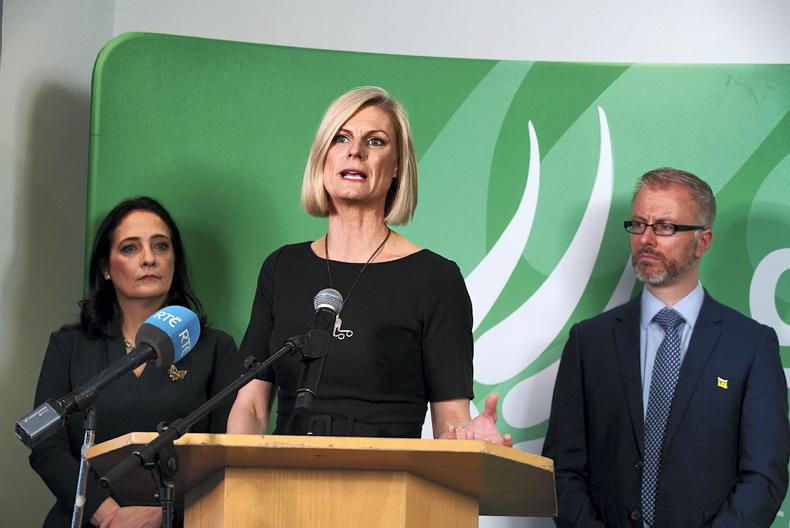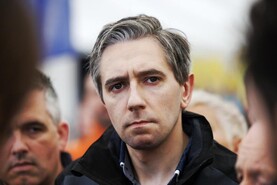“We’ll Rise and Follow Charlie” was how the song went back in the Haughey era.
As we had all expected, Irish farming will be led by Charlie McConalogue for the next two years. It was the obvious and safe decision, in a very obvious and safe reshuffle.
Leo Varadkar and Micheál Martin have opted for minimal change at this halfway point of the coalition’s life.
As had been agreed, the Taoiseach position is being switched between the party leaders of Fianna Fáil and Fine Gael.
A new home had to be found for Micheál Martin, and he has, as widely expected, opted for the Foreign Affairs portfolio.
This, in turn, has seen Simon Coveney take over Leo Varadkar's former role in Enterprise, Trade and Employment.
Throw in a long-agreed swap between Paschal Donohoe and Michael McGrath and that’s about all that’s changed. Simon Harris takes on the Justice role while Helen McEntee is on maternity leave.
Safe and settled
Charlie McConalogue’s comfortable, calm and affable demeanour has cloaked just how much change he has overseen in a little over two years.
A significant CAP reform, with CRISS, BISS, and convergence slashing the highest value entitlements by 40%.
A commitment to reduce farming’s carbon footprint by one-quarter in an eight-year span.
The inevitable ending of dairy expansion entailed by that commitment, especially when coupled with the nitrates cow-banding that will mean dairy farmers must find more land or stock less cows.
And it has been achieved without much public protest.
Around this time last year (late November to be precise), the IFA led a tractorcade through Dublin on a Sunday afternoon, an action preceded by similar events that summer around our county towns, and then four regional rallies in the autumn, but that was about it.
In part, farmers’ mood has been dictated by the decent prices that have maintained incomes despite the enormous hike in commodity prices. If that changes, expect to see more militant talk, and then action, from farm leaders.
We have seen protests at retailers and processors relating to those sectors most exposed in 2022, pig, poultry, fruit and vegetable producers in particular.
It may be that he biggest challenges of Charlie McConalogue’s tenure in agriculture lie ahead.
Juniors must wait ’til Wednesday
In the GAA, the junior match is usually played before the senior game as a warm-up. In Irish politics, it seems it’s the other way around.
The ministers of state in the remodelled Government won’t be announced until Wednesday. That is, apart from the three ‘super juniors’ who were re-confirmed on Saturday night, because they attend cabinet.

Green Party Annual Convention 2022. \ Myles Shelly
Pippa Hackett’s re-appointment in Agriculture House was a formality, as the Green Party had made clear that they were not taking part in any reshuffle.
It’s likely that Martin Heydon will also remain in Kildare Street when the final appointments are confirmed. He, Hackett and McConalogue have forged an effective inter-party alliance in Agriculture House.
Parting words
Micheál Martin made reference to farming and Minister McConalogue in his farewell speech to the Dáil, saying: “Our family farmers remain critical to rural and community life in our country.
“The wider food industry represents a sector which gives secure, well-paid employment throughout the country, and is one area where indigenous industries are world leaders.”
He continued: “Deputy Charlie McConalogue has led his Department in delivering important supports and reforms in the past two years.
“The new legislation for pricing transparency and fairness marks a new moment for farming, and the commitment to support farmers in achieving secure and sustainable incomes will remain at the core of his work.”
It’s interesting that the issue he chose to emphasise was the long-promised transparency legislation. Perhaps this will be a major step forward in ensuring farmers receive a fair share of the retail price, but personally, I won’t be holding my breath.
We’ll have to see what teeth the new Office of Fairness and Transparency in the Agri-Food Supply Chain will have.
Recognising disparities in the margins between the various links in the supply chain is one thing, repairing them is quite another.
Urgent issues
The more urgent issues on McConalogue’s in-tray relate to nitrates, banding and maximum stocking rates on dairy farms, and finding a consensus on how farming addresses the need to curb the size of the national cattle herd.
The negotiations around the dairy, and beef and sheep Food Vision groups reveal the difficult road ahead.
The proposals to provide a voluntary cessation, apart from being controversial, will require significant funding from somewhere. And everyone is watching and waiting to see how the Climate Action Plan sectoral targets are being met. Will the pressure on livestock numbers ratchet up further as the first progress report is made?
Over the last two years, the roadmap for the rest of the decade has been set out. The steps along the road are likely to only get harder, as the road gets steeper in the years ahead.
Will Charlie McConalogue have the head for heights to lead that journey? Only time will tell.
“We’ll Rise and Follow Charlie” was how the song went back in the Haughey era.
As we had all expected, Irish farming will be led by Charlie McConalogue for the next two years. It was the obvious and safe decision, in a very obvious and safe reshuffle.
Leo Varadkar and Micheál Martin have opted for minimal change at this halfway point of the coalition’s life.
As had been agreed, the Taoiseach position is being switched between the party leaders of Fianna Fáil and Fine Gael.
A new home had to be found for Micheál Martin, and he has, as widely expected, opted for the Foreign Affairs portfolio.
This, in turn, has seen Simon Coveney take over Leo Varadkar's former role in Enterprise, Trade and Employment.
Throw in a long-agreed swap between Paschal Donohoe and Michael McGrath and that’s about all that’s changed. Simon Harris takes on the Justice role while Helen McEntee is on maternity leave.
Safe and settled
Charlie McConalogue’s comfortable, calm and affable demeanour has cloaked just how much change he has overseen in a little over two years.
A significant CAP reform, with CRISS, BISS, and convergence slashing the highest value entitlements by 40%.
A commitment to reduce farming’s carbon footprint by one-quarter in an eight-year span.
The inevitable ending of dairy expansion entailed by that commitment, especially when coupled with the nitrates cow-banding that will mean dairy farmers must find more land or stock less cows.
And it has been achieved without much public protest.
Around this time last year (late November to be precise), the IFA led a tractorcade through Dublin on a Sunday afternoon, an action preceded by similar events that summer around our county towns, and then four regional rallies in the autumn, but that was about it.
In part, farmers’ mood has been dictated by the decent prices that have maintained incomes despite the enormous hike in commodity prices. If that changes, expect to see more militant talk, and then action, from farm leaders.
We have seen protests at retailers and processors relating to those sectors most exposed in 2022, pig, poultry, fruit and vegetable producers in particular.
It may be that he biggest challenges of Charlie McConalogue’s tenure in agriculture lie ahead.
Juniors must wait ’til Wednesday
In the GAA, the junior match is usually played before the senior game as a warm-up. In Irish politics, it seems it’s the other way around.
The ministers of state in the remodelled Government won’t be announced until Wednesday. That is, apart from the three ‘super juniors’ who were re-confirmed on Saturday night, because they attend cabinet.

Green Party Annual Convention 2022. \ Myles Shelly
Pippa Hackett’s re-appointment in Agriculture House was a formality, as the Green Party had made clear that they were not taking part in any reshuffle.
It’s likely that Martin Heydon will also remain in Kildare Street when the final appointments are confirmed. He, Hackett and McConalogue have forged an effective inter-party alliance in Agriculture House.
Parting words
Micheál Martin made reference to farming and Minister McConalogue in his farewell speech to the Dáil, saying: “Our family farmers remain critical to rural and community life in our country.
“The wider food industry represents a sector which gives secure, well-paid employment throughout the country, and is one area where indigenous industries are world leaders.”
He continued: “Deputy Charlie McConalogue has led his Department in delivering important supports and reforms in the past two years.
“The new legislation for pricing transparency and fairness marks a new moment for farming, and the commitment to support farmers in achieving secure and sustainable incomes will remain at the core of his work.”
It’s interesting that the issue he chose to emphasise was the long-promised transparency legislation. Perhaps this will be a major step forward in ensuring farmers receive a fair share of the retail price, but personally, I won’t be holding my breath.
We’ll have to see what teeth the new Office of Fairness and Transparency in the Agri-Food Supply Chain will have.
Recognising disparities in the margins between the various links in the supply chain is one thing, repairing them is quite another.
Urgent issues
The more urgent issues on McConalogue’s in-tray relate to nitrates, banding and maximum stocking rates on dairy farms, and finding a consensus on how farming addresses the need to curb the size of the national cattle herd.
The negotiations around the dairy, and beef and sheep Food Vision groups reveal the difficult road ahead.
The proposals to provide a voluntary cessation, apart from being controversial, will require significant funding from somewhere. And everyone is watching and waiting to see how the Climate Action Plan sectoral targets are being met. Will the pressure on livestock numbers ratchet up further as the first progress report is made?
Over the last two years, the roadmap for the rest of the decade has been set out. The steps along the road are likely to only get harder, as the road gets steeper in the years ahead.
Will Charlie McConalogue have the head for heights to lead that journey? Only time will tell.







 This is a subscriber-only article
This is a subscriber-only article










SHARING OPTIONS: